STREAM Activity: Orange Science
Conduct 3 experiments with oranges!
Activity best for children ages 3 and up
Have you ever been hesitant to taste a new fruit or vegetable? Do you wonder why fruits or vegetables look the way they do? How does the fruit or vegetable smell? How does it taste? These are all valid questions when deciding if you want to taste a new fruit or vegetable. This activity will detail how to approach tasting a new fruit or vegetable by investigating like a scientist. When scientists have a question, they follow specific steps called the scientific process to find the answer –
- Make observations and identify the question
- Design an investigation or experiment to explore the question
- Define a hypothesis which means to use your observations to state what you think will happen during the investigation or experiment.
- Test your hypothesis by completing the investigation or experiment
- Discuss your observations and consider whether you answered your question or do you need to start with step 1 again.
One strategy for encouraging a child to try a new food is to offer the food as a separate activity when it is not meal or snack time. The following activity will detail three experiments that you can do with your child to learn more about oranges: Sink-or-Float, Dissection and Taste Test.
Note – children should always be supervised by an adult when investigating, preparing or eating food so that adults can be aware of choking hazards or food allergies and encourage safe handling of food and food preparation materials.
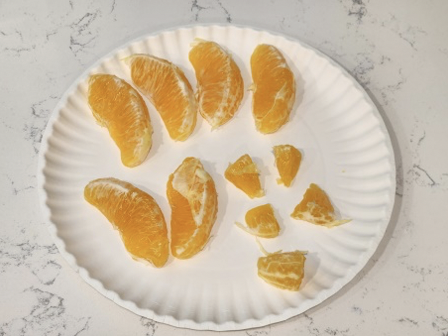
Materials:
(Note all materials and surfaces should be clean and food-safe as the last experiment is a taste test)
1 orange
Cutting board, plate, or other food-safe surface to work on
Clear container filled with clean water. Container should be a size that allows the orange to be submerged in the water
(optional) Child-safe utensils
Guiding Questions:
What do you see, feel, smell, or taste?
What parts of the orange can you eat?
Why are oranges considered a healthy food?
Directions
Step 1
Gather your materials. Remember to wash your hands and work on a clean, food-safe surface as the last experiment will be a taste test.
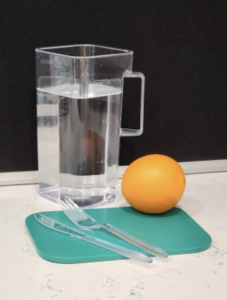
Step 2
Experiment #1, Part 1: Sink-or-Float (orange with peel on)
Discuss the question, “will the orange float in the water?” and make a hypothesis about what you think will happen. Test the hypothesis by placing the orange in the water. Discuss what you observe. Was the result what you expected?
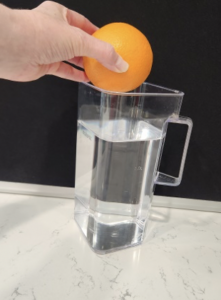
Step 3
Experiment #1, Part 2: Sink-or-Float (orange with peel removed)
Remove the peel from the orange, saving the peel aside.
Discuss the question, “will the orange still float in the water without the peel on?” and make a hypothesis about what you think will happen. Test the hypothesis by placing the orange in the water. Discuss what you observe. Why do you think the orange floats with the peel on but sinks once the peel is removed?
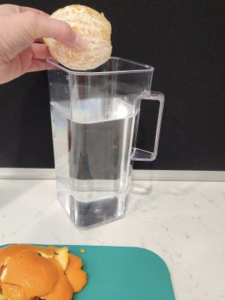
Step 4
Experiment #2, Orange Dissection
Discuss what you expect to find when you investigate the orange in more detail. Start by pulling the sections of the orange apart. Use fingers or child-safe utensils to investigate and cut the orange apart. Share your observations about what you feel, see, and smell. Is it what you expected? Create piles of the different parts of the orange and discuss which parts are edible.
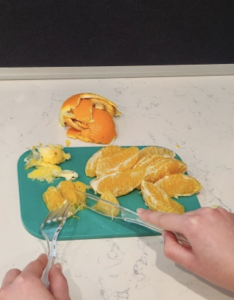
Step 5
Experiment #3, Taste Test
Discuss how you expect the orange to taste. If still hesitant, you might want to start by licking a small piece of the orange before placing a piece into your mouth. What does the orange taste like? Does it taste how you expected it to? Does it taste similar to any other fruits you have ever had? Would you eat it again?
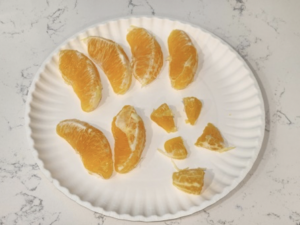
Grown Ups-Are you looking for more ways to extend your child’s learning? Check out these extension activities to build upon today’s STREAM activity!
Reading Connections
“Eating the Alphabet: Fruits & Vegetables from A to Z” by Lois Ehlert
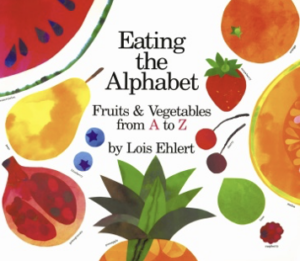
Real World Connections
Encourage children to participate in shopping or meal planning by discussing fruits and vegetables that they are willing to try. Consider making a new recipe that includes a fruit or vegetable chosen by your child.
Share your orange experiments with us on Instagram by tagging @sdcdm320!
Questions about this activity? Email education@sdcdm.org

